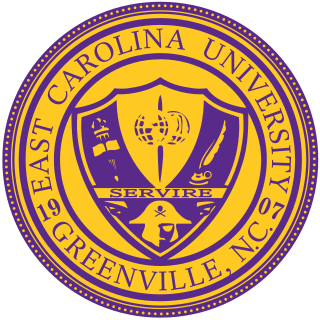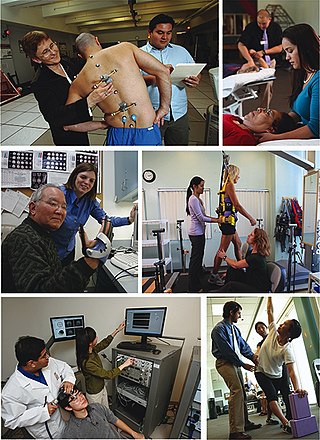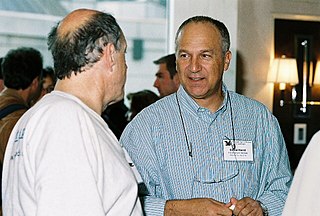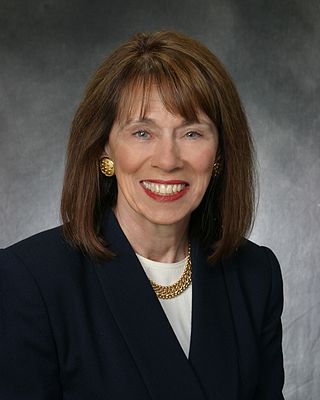Related Research Articles

East Carolina University (ECU) is a public university in Greenville, North Carolina, United States. It is the fourth largest university in North Carolina and the only one in the state with schools of medicine, dentistry and engineering.

Kinesiology is the scientific study of human body movement. Kinesiology addresses physiological, anatomical, biomechanical, pathological, neuropsychological principles and mechanisms of movement. Applications of kinesiology to human health include biomechanics and orthopedics; strength and conditioning; sport psychology; motor control; skill acquisition and motor learning; methods of rehabilitation, such as physical and occupational therapy; and sport and exercise physiology. Studies of human and animal motion include measures from motion tracking systems, electrophysiology of muscle and brain activity, various methods for monitoring physiological function, and other behavioral and cognitive research techniques.

Sports science is a discipline that studies how the healthy human body works during exercise, and how sports and physical activity promote health and performance from cellular to whole body perspectives. The study of sports science traditionally incorporates areas of physiology, psychology, anatomy, biomechanics, biochemistry, and kinesiology.

David Harel is a computer scientist, currently serving as President of the Israel Academy of Sciences and Humanities. He has been on the faculty of the Weizmann Institute of Science in Israel since 1980, and holds the William Sussman Professorial Chair of Mathematics. Born in London, England, he was Dean of the Faculty of Mathematics and Computer Science at the institute for seven years.
East Carolina University College of Health and Human Performance is an American college of Health and Human Performance. It has five departments and nine laboratories. It offers degrees in Bachelor of Science, Bachelor of Arts, Master of Arts, Master of Arts in Education, Master of Science and Ph.D.

Leon Ong Chua is an American electrical engineer and computer scientist. He is a professor in the electrical engineering and computer sciences department at the University of California, Berkeley, which he joined in 1971. He has contributed to nonlinear circuit theory and cellular neural network theory.
Exercise prescription commonly refers to the specific plan of fitness-related activities that are designed for a specified purpose, which is often developed by a fitness or rehabilitation, or Exercise medicine specialist for the client or patient. Due to the specific and unique needs and interests of the client/patient, the goal of exercise prescription should focus on motivation and customization, thus making achieving goals more likely to become successful. Exercise prescription should take into account the patient's medical history, and a pre-examination of a patient's physical fitness to make sure a person has the capacity to perform the exercises.

K. Srinath Reddy is an Indian physician and the Former President of the Public Health Foundation of India and formerly headed the Department of Cardiology at All India Institute of Medical Sciences (AIIMS).

SWPS University is a private non-profit university in Poland established in 1996 by three psychology professors, Andrzej Eliasz, Zbigniew Pietrasiński and Janusz Reykowski.

Ernest Jeffrey Moniz, GCIH is an American nuclear physicist and former government official. From May 2013 to January 2017, he served as the 13th United States secretary of energy in the Obama administration. Prior to this, Moniz served as associate director for science in the Office of Science and Technology Policy in the Executive Office of the President of the United States from 1995 to 1997 and undersecretary of energy from 1997 to 2001 during the Clinton administration. He is currently the co-chair and CEO of the Nuclear Threat Initiative (NTI), as well as president and CEO of the Energy Futures Initiative (EFI), a nonprofit organization working on climate and energy technology issues, which he co-founded in 2017.

Coming Together is a 2-minute ad created and distributed by the Coca-Cola Company and launched on the night of January 14, 2013, on several cable networks.

Per-Olof Åstrand was a Swedish professor of physiology at the Swedish School of Sport and Health Sciences (GIH) in Stockholm 1970–1977, and 1977–1988 at the Karolinska Institute in Stockholm, Sweden, and a member of the Nobel Assembly at Karolinska Institutet (1977–1988). Åstrand is considered a "pioneer", "legend" and one of the "founding fathers" of modern exercise physiology.

Patricia A. Grady is an American neuroscientist internationally recognized for her research on stroke, which specializes in cerebral blood flow, metabolism, and function. She is director of the National Institute of Nursing Research (NINR), part of the National Institutes of Health (NIH) in Bethesda, Maryland. Grady was elected to the Institute of Medicine in 1999 and is a member of several scientific organizations, including the Society for Neuroscience and the American Academy of Nursing. She is a fellow of the American Stroke Association and the American Neurological Association.
The Global Energy Balance Network (GEBN) was a US-based nonprofit organization claiming to fund research into causes of obesity, but was primarily known for promoting the idea that lack of physical exercise, not bad diet, was primarily responsible for the obesity epidemic. It has been characterised as an astroturfing organisation. It received substantial funding from Coca-Cola. It has been criticised by nutrition experts for downplaying the role of junk food in obesity. Critics have also accused the American College of Sports Medicine (ACSM) of supporting GEBN. The ACSM claims it had no affiliation with GEBN.

Harkishan Singh was Professor Emeritus at the Panjab University. He was a well recognized pharmaceutical academic, medicinal chemistry researcher and science historian. He had more than half a century experience in his respective fields to his credit. He worked at the Banaras Hindu University, University of Saugar, and the Panjab University in India, and abroad at the University of Maryland, University of Mississippi and the University of London.

William Allen Eaton is a biophysical chemist who is a NIH Distinguished Investigator, Chief of the Section on Biophysical Chemistry, and Chief of the Laboratory of Chemical Physics at the National Institute of Diabetes and Digestive and Kidney Diseases, one of the 20 Institutes of the United States National Institutes of Health.
Kathleen Anne Martin Ginis is a Canadian exercise behavioural scientist. She is a Full professor in the Department of Medicine and in the School of Health and Exercise Sciences at the University of British Columbia. She also holds the Reichwald Family UBC Southern Medical Program Chair in Preventive Medicine. She is a Fellow of the Royal Society of Canada and the Canadian Academy of Health Sciences.

The Universidad Nacional del Altiplano de Puno is a public university located in the city of Puno, Peru.
Kerry Stephen Courneya is a Canadian kinesiologist. As a Full Professor and Canada Research Chair in Physical Activity and Cancer at the University of Alberta, his research focuses on physical activity after a cancer diagnosis.
References
- ↑ "Blair, Steven N. 1939-". Contemporary Authors. Retrieved 30 January 2019.
- ↑ Neighmond, Patti (25 April 2011). "Sitting All Day: Worse For You Than You Might Think". NPR. Retrieved 30 January 2019.
- ↑ Foreman, Judy (19 July 2010). "Swimming with the fittest?". Los Angeles Times. Retrieved 30 January 2019.
- ↑ Weber, Bruce (21 April 2005). "Losing Patience, Not Weight". The New York Times. Retrieved 30 January 2019.
- ↑ "Steven N. Blair CV". University of South Carolina. Retrieved 30 January 2019.
- ↑ "2011 Winner". Manulife Prize. Retrieved 30 January 2019.
- ↑ "About Steven Blair". Health & Kinesiology Distinguished Lecture Series. Texas A&M University. Retrieved 30 January 2019.
- ↑ Shain, Andrew (10 November 2015). "USC not returning Coca-Cola grant for obesity network". The State. Retrieved 30 January 2019.
- ↑ O'Connor, Anahad (10 August 2015). "Coca-Cola Funds Scientists Who Shift Blame for Obesity Away From Bad Diets". CNBC. Retrieved 30 January 2019.